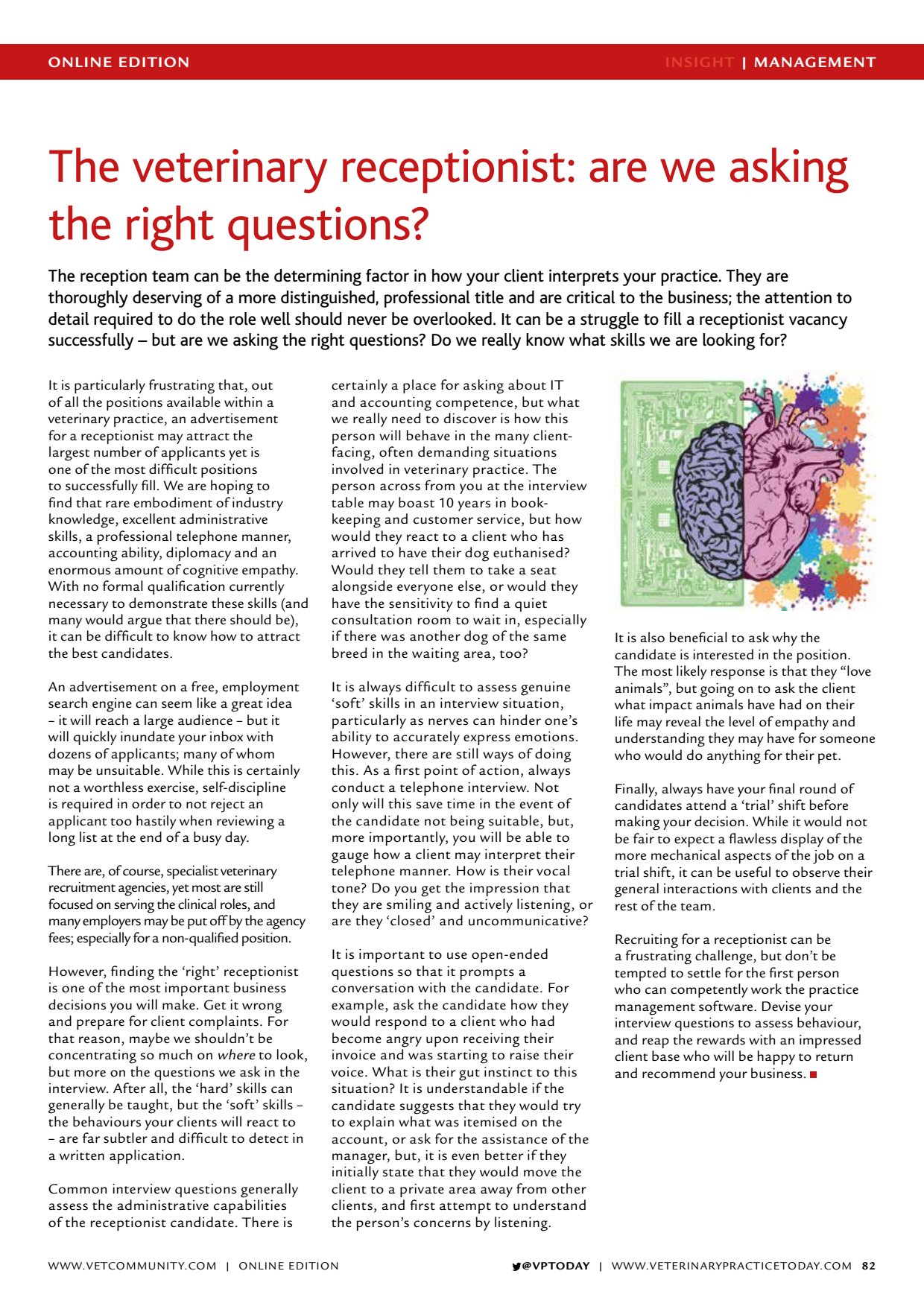veterinary receptionist asking
INSIGHT | MANAGEMENT VPTODAY | WWW.VETERINARYPRACTICETODAY.COM 82 The veterinary receptionist: are we asking the right questions? The reception team can be the determining factor in how your client interprets your practice. They are thoroughly deserving of a more distinguished, professional title and are critical to the business; the attention to detail required to do the role well should never be overlooked. It can be a struggle to fill a receptionist vacancy successfully but are we asking the right questions? Do we really know what skills we are looking for? It is particularly frustrating that, out of all the positions available within a veterinary practice, an advertisement for a receptionist may attract the largest number of applicants yet is one of the most difficult positions to successfully fill. We are hoping to find that rare embodiment of industry knowledge, excellent administrative skills, a professional telephone manner, accounting ability, diplomacy and an enormous amount of cognitive empathy. With no formal qualification currently necessary to demonstrate these skills (and many would argue that there should be), it can be difficult to know how to attract the best candidates. An advertisement on a free, employment search engine can seem like a great idea it will reach a large audience but it will quickly inundate your inbox with dozens of applicants; many of whom may be unsuitable. While this is certainly not a worthless exercise, self-discipline is required in order to not reject an applicant too hastily when reviewing a long list at the end of a busy day. There are, of course, specialist veterinary recruitment agencies, yet most are still focused on serving the clinical roles, and many employers may be put off by the agency fees; especially for a non-qualified position. However, finding the right receptionist is one of the most important business decisions you will make. Get it wrong and prepare for client complaints. For that reason, maybe we shouldnt be concentrating so much on where to look, but more on the questions we ask in the interview. After all, the hard skills can generally be taught, but the soft skills the behaviours your clients will react to are far subtler and difficult to detect in a written application. Common interview questions generally assess the administrative capabilities of the receptionist candidate. There is certainly a place for asking about IT and accounting competence, but what we really need to discover is how this person will behave in the many client- facing, often demanding situations involved in veterinary practice. The person across from you at the interview table may boast 10 years in book- keeping and customer service, but how would they react to a client who has arrived to have their dog euthanised? Would they tell them to take a seat alongside everyone else, or would they have the sensitivity to find a quiet consultation room to wait in, especially if there was another dog of the same breed in the waiting area, too? It is always difficult to assess genuine soft skills in an interview situation, particularly as nerves can hinder ones ability to accurately express emotions. However, there are still ways of doing this. As a first point of action, always conduct a telephone interview. Not only will this save time in the event of the candidate not being suitable, but, more importantly, you will be able to gauge how a client may interpret their telephone manner. How is their vocal tone? Do you get the impression that they are smiling and actively listening, or are they closed and uncommunicative? It is important to use open-ended questions so that it prompts a conversation with the candidate. For example, ask the candidate how they would respond to a client who had become angry upon receiving their invoice and was starting to raise their voice. What is their gut instinct to this situation? It is understandable if the candidate suggests that they would try to explain what was itemised on the account, or ask for the assistance of the manager, but, it is even better if they initially state that they would move the client to a private area away from other clients, and first attempt to understand the persons concerns by listening. It is also beneficial to ask why the candidate is interested in the position. The most likely response is that they love animals, but going on to ask the client what impact animals have had on their life may reveal the level of empathy and understanding they may have for someone who would do anything for their pet. Finally, always have your final round of candidates attend a trial shift before making your decision. While it would not be fair to expect a flawless display of the more mechanical aspects of the job on a trial shift, it can be useful to observe their general interactions with clients and the rest of the team. Recruiting for a receptionist can be a frustrating challenge, but dont be tempted to settle for the first person who can competently work the practice management software. Devise your interview questions to assess behaviour, and reap the rewards with an impressed client base who will be happy to return and recommend your business. WWW.VETCOMMUNIT Y.COM | ONLINE EDITION ONLINE EDITION
